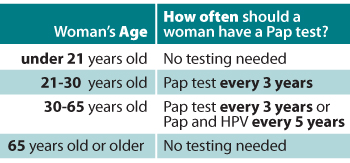Cervical Cancer Screening Guidelines
Women no longer need to get a Pap test every year.
Cervical cancer is one of the most preventable cancers that affect women. Routine testing and early treatment can reduce women's risk.
Revised cervical cancer guidelines recommend routine testing every three years for women ages 21-65. Women under 21 and over 65 do not need be tested. There is also an option of a lengthened, five-year screening interval for women ages 30-65 when screened with a combination of Pap testing and human papillomavirus (HPV) testing.
What is cervical cancer?
Cervical cancer is cancer that starts in a woman's cervix. The cervix is the lower, thin opening of the uterus that connects the vagina (or birth canal) to the uterus. Cervical cancer grows slowly over time and usually starts with abnormal changes to the cells on the cervix, known as dysplasia. Removing these abnormal cells can prevent cervical cancer. 99% of cervical cancer is caused by HPV infection. Most women don't have symptoms until cervical cancer has progressed.
What causes it?
Cervical cancer is almost always caused by the human papillomavirus (HPV), which is so common that most people are infected at some point in their lives. There usually aren't any symptoms and the infection typically resolves on its own without treatment.
Some types of HPV cause genital warts, but no cervical changes or precancerous conditions, while other types cause cervical changes, which, over time, can lead to cervical cancer. Persistent infection with high risk HPV is the leading cause of cervical cancer.
HPV is passed through genital or skin-to-skin contact most often during vaginal or anal sex. Most people get it soon after they start having sex and it may be found years later. You cannot feel or see HPV.
There are two tests that screen for cervical cancer:
Pap test (Papanicolaou test)
A Pap test looks at cells on the cervix and is often done during a routine pelvic exam. It looks for changes on the cervix that could become cervical cancer if not treated. If your Pap test results show cells that are not normal and may become cancer, your health care provider will contact you for follow-up. There are many reasons why Pap test results might not be normal. It usually does not mean you have cancer.
HPV test
The HPV test looks for the types of the virus that cause most cases of cervical cancer, the high-risk types. The HPV test can be done at the same time as the Pap test using either the same sample of cells or a second sample taken right after the Pap test. A positive result for high-risk HPV means that you should be followed closely to make sure that abnormal cells do not develop.
Preventing Cervical Cancer is easy.
Your risk for cervical cancer depends on your sexual history, your immune system, your health, and your lifestyle. There are other factors that increase a woman's risk of developing cervical cancer, including:
- Age - the majority of cervical cancers occur in women over age 30
- Smoking - women who smoke are twice as likely as nonsmokers to develop cervical cancer
- Having HIV, the virus that causes AIDS, or another condition that makes it hard for your body to fight off health problems
- Exposure to diethylstilbestrol (DES) before birth
- Personal history of precancer of the cervix
Women can reduce their risk for developing cervical cancer by getting recommended Pap tests, being immunized against HPV, and not smoking. Women who are sexually active can reduce their risk for HPV infection by using latex condoms during sex and limiting the number of sexual partners.
Females between the ages of 9 and 26 or their parents can talk to their doctors about the HPV vaccine, which protects against the types of HPV that cause most cervical cancers. But it is still important for women to continue to have a Pap test even if they've had the HPV vaccine because the vaccine is not 100% effective. For more information about the HPV vaccine, visit: Questions and Answers about Human Papillomavirus (HPV) Vaccine
The New York State Department of Health Cancer Services Program (CSP) provides free cervical, breast and colorectal cancer screening and diagnostic services for uninsured and underinsured New Yorkers. Uninsured women can call the CSP toll-free referral line 1-866-442-CANCER, 24 hours a day, 7 days a week, to be directly connected to cancer screening services in the county in which they live or work.
For more information about the CSP, visit: New York State Cancer Services Program.
Women should talk with their doctor about how often to get screened for cervical cancer. The Pap test is one test not needed every year!
Revised cervical cancer screening guidelines released in March 2012 by the United States Preventive Services Task Force, the American Cancer Society, and supported by the Centers for Disease Control and Prevention, recommend against yearly testing.
Want more information?
- For more information about cervical cancer screening for women ages 30 and older, visit: Cervical cancer screening with the HPV test and the Pap test in women ages 30 and older (PDF) - CDC.gov
- For more information about cervical cancer, visit: Frequently Asked Questions About Cervical Cancer
